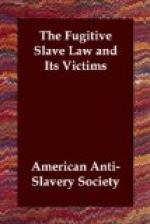On the 26th February, Commissioner Pendery gave his decision. First, he refused to discharge Margaret and three others from the custody of the United States Marshal and deliver them to the Sheriff of Hamilton County, although held to answer, under the laws of Ohio, to the charge of murder. He then proceeded to consider the claim of Marshall to three of the slaves, decided it to be valid, and ordered them into Marshall’s custody. He then considered Gaines’s claim to Margaret and her three surviving children, decided that also to be good and valid, and ordered them to be delivered into the possession of said Gaines.
The case of the rightful custody, as between the United States Marshal and the Ohio Sheriff also came on, February 26th before Judge Leavitt, of the United States District Court, and was argued by counsel on both sides. On the 28th, Judge Leavitt decided that the custody was with the United States Marshal. The substance of Judge L.’s argument and decision is found in the following extract.
“Judge McLean says: ’Neither this nor any other Court of the United States, nor Judge thereof, can issue a habeas corpus to bring up a prisoner who is in custody under the sentence or execution of a State Court, for any other purpose than to be used as a witness. And it is immaterial whether the imprisonment be under civil or criminal process.’ If it be true, as there asserted, that no Federal Court can interfere with the exercise of the proper jurisdiction of a State Court, either in a civil or criminal case, the converse of the proposition is equally true. And it results that a State Court cannot take from an officer of the United States, even on a criminal charge, the custody of a person in execution on a civil case.
“It is said in argument that if these persons cannot be held by the arrest of the Sheriff under the State process, the rights and dignity of Ohio are invaded without the possibility of redress. I cannot concur in this view. The Constitution and laws of the United States provide for a reclamation of these persons, by a demand on the Executive of Kentucky. It is true, if now remanded to the claimant and taken back to Kentucky as slaves, they cannot be said to have fled from justice in Ohio; but it would clearly be a case within the spirit and intention of the Constitution and the Act of Congress, and I trust nothing would be hazarded by the prediction that upon demand properly made upon the Governor of Kentucky, he would order them to be surrendered to the authorities of Ohio to answer to its violated law. I am sure it is not going too far to say that if the strictness of the law did not require this, an appeal to comity would not be in vain.”
Mr. Chambers said his client, Mr. Gaines, authorized him to say that he would hold the woman Margaret, who had killed her child, subject to the requisition of the Governor of Ohio, to answer




